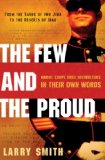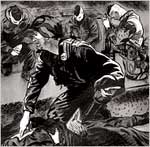
In the Belly of the Green Bird; The Triumph of the Martyrs in Iraq, by Nir Rosen.
[rating:4/5]
Nir Rosen’s book gives us something I hadn’t seen much before- the view of an occupied Iraq from the Arabic point of view:
A nervous soldier asked me to go explain the situation to the bespectacled staff sergeant, who had been attempting to calm the situation by telling the demonstrators, who did not speak English, that the U.S. patrol meant no harm. He finally lost his temper when and Iraqi told him gently, “You must go.”
“I have the weapons,” the sergeant said. “You back off.”
“Let’s get the fuck out!” one marine shouted to another, as the tension increased. I was certain that a shove, a tossed stone, or a shot fired could have provoked a massacre and turned the city violently against the American occupation. Finally, the marines retreated cautiously around a corner, as the worshipers were held back by their own men. Women peered at the marines from behind cracked open doors and children waved to them and gave them a thumbs-up.
Rosen, a Turk, is able to travel and speak with the Iraqi people, imams, and fighters, in a way that I have not seen anywhere else. He carefully details the change in Iraq from the heady liberation, the growth of the insurgency, and today’s sectarian strife:
Haidar was the father or two children and a frail man, with an attenuated body made even smaller by the immense turban he wore that pressed down on his large ears. Wide eyes and a long nose protruded from his long, thin face, made longer by a beard. In Moqtada’s prison, he was chained to a column and beaten. He claims he was also tortured with electric shocks. Haidar’s forehead is scarred because his keepers bashed it into a column. He claims there were about thirty-five detainees in the prison, including a twelve-year-old accused of homosexuality and a fourteen-year-old who stole money.
Haidar was finally released after his face was broadcast on TV as a missing person and representatives from the seminary pressured Moqtada’s office. His true “crime” had been some public statements blaming Moqtada’s men for a murder back in April 2003.
As a westerner, it did get hard keeping track of who is who. Rosen interviews so many key figures that it’s often an effort to keep up. But it’s so worthwhile. His is one missing viewpoint in most American minds.
My last night I sat with my friends on Sandra, my favorite fresh fruit juice and ice cream place, happy that the owner still recognized me and remembered my usual drink, a strawberry and banana milkshake. One friend, a Sunni, confided to me that things had been much better under Saddam. Another friend was annoyed that Iraqis could be celebrating Eid and ignoring the horror all around them. Yet, he said, “They could level all of Baghdad and it would still be better than Saddam. At least we have hope.”
A few weeks later the same friend e-mailed me in despair: “I’m living here in the middle of shit, a civil war will happen I’m sure of it… You can’t be comfortable talking with a man until you know if he is Shia or Sunni…People don’t trust each other…To be clear, now Shia are Iranians for the Sunni, and Sunni are Salafi terrorists for the Shia. We have a civil war here; it is only a matter of time, and some peppers to provoke it.”
In the Belly of the Green Bird; The Triumph of the Martyrs in Iraq, by Nir Rosen. Grade: B


























